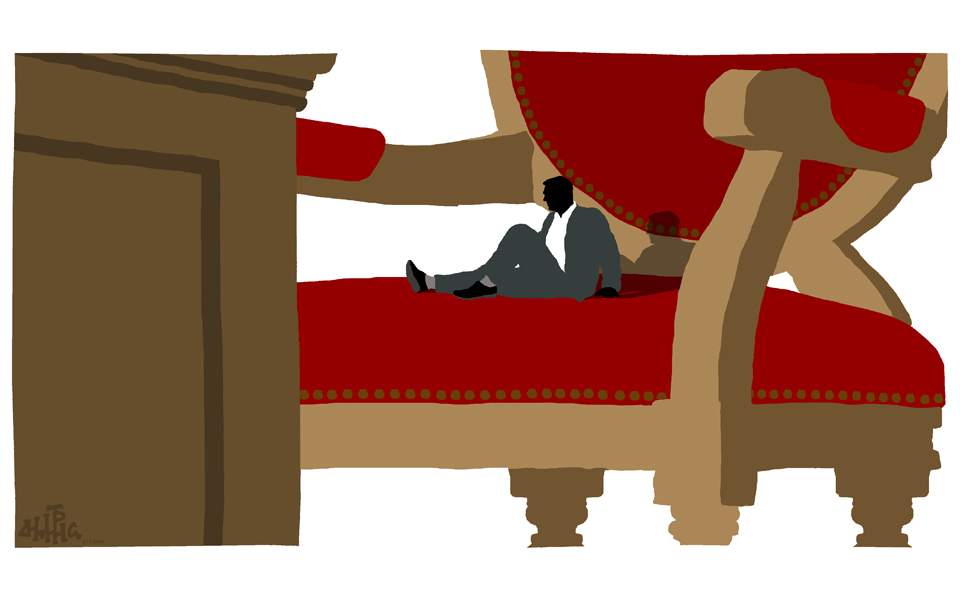The political world of make-believe

More and more I am convinced that “mythistorima” (the Greek word for a novel) is the best way to describe our modern world. As one of the founders of modern Greece, Adamantios Korais, explained, it is “a fictional but plausible story,” which exactly defines the charade of contemporary politics – not just in Greece but throughout the European Union and Donald Trump’s USA. The combination, collision, and collusion of myth and history, the unbelievable and the real, create a hybrid which is the political world of make-believe.
In the novel, what the narrator tells us as verifiable fact is inextricably mixed with an exercise in the imagination. Life should be like that: We use our imagination to change our mental picture of “how it is” to give us a better idea of “how it could be.” When that extends to politics, we expect our leaders to show imagination in the form of a vision of the future. When that vision turns out to be a mirage of their own making, then we know that we are living in a novel written by a malevolent author consumed by black humor.
In novels, the more complex the interweaving of fact and fantasy, myth and history, the more exciting the storyline for the reader. In politics, the idea that we should accept history as myth, and myth as history, pushes the ordinary citizen into areas of disbelief that emulate “Alexia in Wonderland” at the best of times and “Dinos’s Inferno” at the worst. And it’s the worst scenario that we seem to be reading at present.
I don’t watch television so I don’t know if Greek politicians answer a question with “I’m glad you asked me that” before supplying the answer to the question they would have preferred to have been asked. This is the strategy adopted elsewhere – in Britain and Ireland, for example – by government ministers who have been well trained by their “minders.” It means “You want a story which will satisfy your curiosity. Here’s a better story I just made up, which will explain why I can’t fulfil my election promises. It sounds good and will last as long as this interview and will make tomorrow’s newspapers. But don’t believe it. I don’t.”
Within any story, within any drama, there is a secret waiting to be told. From Medea’s rage against Jason, and Antigone’s defiance of Creon, these secrets are at the tragic center of anyone’s life. So why should we think it unreal that political life also contains secrets?
There has always been an opaque area of government, issues such as national security and diplomacy, which must remain hidden from general view but which are known to an elite cadre of generals, ambassadors, spies and anti-terrorism chiefs.
The tragedy of modern Greek politics is that the best secrets are known to everyone. No one hides the fact that the brightest graduates are emigrating in their thousands; no one can turn a blind eye to the shrinking of the economy or the continuing refugee crisis. These “secrets” are out in the open, common gossip, we walk past them every day, and that is why they don’t disturb us, as “real” secrets should.
As for the mythistorima of Greek politics, the history is only too painfully obvious but the myth can no longer excuse it. Make-believe has stopped working. We have now reached the point where “verifiable fact” is often unavailable and only by an exercise of the imagination can we believe in “reality.”
When the American president can insert a negative into a positive statement and still insist that it changes nothing, we are all in neverland. When a senior Greek official is convicted of telling the truth when he was ordered to tell lies, the idea of transparency moves into this neverland, where politicians are so comfortable.
As I never tire of pointing out, Alexandros Papadiamantis summed up all human life when he wrote, “The smaller the village, the greater the evil.” The village of the Vouli (Parliament) is a perfect microcosm of society: a policeman, a couple of priests, a schoolteacher, a shopkeeper, a liar, an idiot, a usurer, a petty thief, a whore, the “what’s-in-it-for-me?” and the know-all. And a few schoolchildren who are not yet old enough to emigrate. All human life is there, sitting in the old royal palace, looking across the bizarrely named Syntagma Square at the Finance Ministry. Every one of them is capable of behaving honorably in the interests of the community and equally capable of betraying his or her fellow citizens.
Alexis Tsipras may be one of the most ineffectual premiers ever – even more than George Papandreou – but there is no alternative except to restore the dynastic politics which has already destroyed the sense of public ethics.
The merger between the credible and the unbelievable, between the real and the imaginary, the art of the possible and the art of the impossible, is complete. There is no longer a line between myth and history.
Richard Pine is director of the Durrell Library of Corfu (where he lives) and author of “Greece Through Irish Eyes.” The opinions expressed in this article do not necessarily reflect those of Kathimerini.





